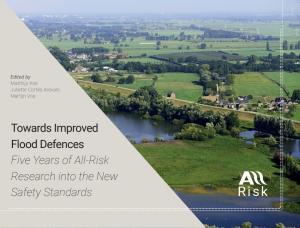Towards Improved Flood Defences: Five Years of All-Risk Research into the New Safety Standards
Keywords:
flood defences, safety standards, dikes, risk framework, flood risk managementSynopsis
Without our dikes and dunes, 60% of the Netherlands would flood on a regular basis. This area is home to 9 million people.
The latest report of the Intergovernmental Panel on Climate Change (IPCC, February 2022) underlines the importance of reinforcing water safety. Sea levels are rising and extreme weather is becoming increasingly common. The Flood Protection Programme, the largest Dutch water safety operation since the Delta Works, will help us minimise the likelihood of flooding.
New knowledge and innovation are urgently needed The Dutch dikes have stood firm for more than 1,000 years. After disasters in 1916 and 1953, storm surge barriers and dams have been added to the network of protective dikes. Following the floods in 1993 and 1995, the Room for the River programme was implemented. New knowledge of flood risks led to the introduction of new, often stricter standards for flood defences in 2017.
Funder: NWO Domain Applied and Engineering Sciences P15-21.
Downloads
References
Calle, E.O.F. & Knoeff, J.G. (2002). Dijkdoorbraakprocessen: Beschrijving, doorbraakprocessen en reststerkte (GeoDelft-report 720201/39). Delft Cluster. http://resolver.tudelft.nl/uuid:d3a25bfd-afd3-4519-9b07-68140932cafc
EurOtop, 2018. Manual on wave overtopping of sea defences and related structures. An overtopping manual largely based on European research, but for worldwide application. Van der Meer, J.W., Allsop, N.W.H., Bruce, T., De Rouck, J., Kortenhaus, A., Pullen, T., Schüttrumpf, H., Troch, P. & Zanuttigh, B., www.overtopping-manual.com.
Expertise Netwerk Waterveiligheid [ENW] (2020). Naar geloofwaardige overstromingskansen. https://www.enwinfo.nl/publish/pag-es/183270/enw-20-01b-achtergrondrapportage-naar-geloofwaardige-overstromingskansen-dv.pdf
Gouw, M.J.P. (2017). Alluvial architecture of fluvio-deltaic successions: a review with special reference to Holocene settings. Netherlands Journal of Geosciences, 86(3), 211-227. https://doi.org/10.1017/S0016774600077817
Grubert, P. (2013). Saaledeich bei Breitenhagen, Geotechnische Untersu-chungen der Bruchstelle, Empfehlungen zur Sanierung. Gesellschaft für Grundbau und Umwelttechnik mbH, Magdeburg
Hoffmans, G.J.C.M. (2014). Erosiebestendigheid Overgangen: Validatie Engineering Tools (Deltares report 1209437-003). Deltares. https://repository.tudelft.nl/islandora/object/uuid%3Ac77cec99-4c56-4412-86de-458c3ddc9e50
Huismans, Y., Van Velzen, G., Mahoney, T.S.D.O., Hoffmans, G. & Wiers-ma, A.P. (2016). Scour hole development in river beds with mixed sand-clay-peat stratigraphy. In: ICSE 2016, 8th Int. Conf. on Scour and Erosion, 12-15 September 2016, Oxford, UK. https://doi.org/10.1201/9781315375045-100
Interagency Performance Evaluation Task Force [IPET] (U.S.) & United States (Eds.) (2006). Performance evaluation of the New Orleans and Southeast Louisiana hurricane protection system: Draft final report of the Interagency Performance Evaluation Task Force [Electronic re-source]. US Army Corps of Engineers. https://ipet.wes.army.mil
Jonkman, S. N., Slager, K., Moll, R., van den Hurk, B., Rongen, G., Strijk-er, B., Pol, J.C., Kok, M., Kolen, B., Rikkert, S.J.H., Schlumberger, J., van Haren, M. & Wüthrich, D. (2021). Hoogwater 2021: Feiten en Duiding. Expertise Netwerk Waterveiligheid.
Jüpner, R., Brauneck, J. & Pohl, R. (2015). Einsatz von Drohnen im Hoch-wasserfall - Erfahrungen und Ideen. WasserWirtschaft 9(2015), 49-54. https://doi.org/10.1007/s35147-015-0580-5
Klijn, F., ten Brinke, W., Asselman, N. & Mosselman, E. (n.d.). Het Verhaal van de Rivier: een eerste versie. Deltares/Rijkswaterstaat. https://ede-pot.wur.nl/460187
Knaake, S.M., Straatsma, M.W., Huismans, Y., Cohen, K.M., Stouthamer, E. & Middelkoop, H. (2019). The influence of subsurface heterogeneity on scour hole development in the Rhine-Meuse delta, the Netherlands. NCR Abstract.
Kok, M., Jongejan, R., Nieuwjaar, M., Tánczos, I. (2017). Fundamentals of Flood Protection. Expertise Network for Flood Protection (ENW). https://www.enwinfo.nl/publicaties
Man, C. (2021). Visualization of the Random Material Point Method for macro-instability [Master Thesis, Delft University of Technology]. http://resolver.tudelft.nl/uuid:9d24b208-9d5a-4bff-bfca-9ebb87347ee0
Möller, I., Kudella, M., Rupprecht, F. et al. (2014). Wave attenuation over coastal salt marshes under storm surge conditions. Nature Geosci 7, 727-731. https://doi.org/10.1038/ngeo2251
Pol, J.C., Kanning, W., & Jonkman, S.N. (2021). Temporal Development of Backward Erosion Piping in a Large-Scale Experiment. Journal of Geotechnical and Geoenvironmental Engineering, 147(2). https://doi.org/10.1061/(ASCE)GT.1943-5606.0002415
Province of Gelderland (2019). Ga voor de Grebbedijk Nota Voorkeursalternatief. https://www.grebbedijk.com/kennisbank/200416_grebbedijk_adviesnota-vka_incl_bijlagen_v3.pdf
Remmerswaal, G., Vardon, P.J., Hicks, M.A. (2021). Evaluating residual dyke resistance using the Random Material Point Method. Computers and Geotechnics 133(2021), 104034. https://doi.org/10.1016/j.compgeo.2021.104034
Rijkswaterstaat (2019). Programmaplan BOI 2020-2023. https://www.helpdeskwater.nl/publish/pages/178471/programmaplan_boi_1.pdf
Rijkswaterstaat (2017). Beoordelingsinstrumentarium (WBI2017). https://www.helpdeskwater.nl/onderwerpen/waterveiligheid/primaire/beoordelen/beoordelingsinstrumentarium-wbi2017-0/
Robbins, B.A. & Sharp M.K. (2016). Incorporating Uncertainty into Back-ward Erosion Piping Risk Assessments. E3S Web Conf., 7 (2016) 03007. https://doi.org/10.1051/e3sconf/20160703007
Rondags, drs. E.J.N. (RAAP) (2019): Lent zones K en L, archeologisch di-jkonderzoek, gemeente Nijmegen. DANS.
Roode, N., Maaskant, B., Boon, M. (2019). Handreiking Voorlanden. Projectoverstijgende Verkenning Voorlanden.
Silvis, F. (1991). Verificatie Piping Model; Proeven in de Deltagoot. Evaluatierapport. Rapport Grondmechanica Delft, CO317710/7.
Slager, K., de Moel, H., & de Jong, J.. (2021). Maximum flood extents Limburg floods July 2021 (Version 1). 4TU.ResearchData.
STOWA (2017). DeltaFacts: Meerlaagsveiligheid in de praktijk. Retrieved April 11, 2022, from https://www.stowa.nl/deltafacts/waterveiligheid/innovatieve-dijkconcepten/meerlaagsveiligheid-de-praktijk
TAW, (2002). Wave Run-up and Wave Overtopping at Dikes (Technical Report). Written by Van der Meer, J.W. The Technical Advisory Committee on Flood Defence. http://www.overtopping-manual.com/as-sets/downloads/TRRunupOvertopping.pdf
Temmink, R.J.M., Angelini, C., Fivash, G.S., Swart, L., Nouta, R., Teunis, M., Lengkeek, W., Didderen, K., Lamers, L.P.M., Bouma, T.J. & van der Heide, T. (2021). Life cycle informed restoration: Engineering settlement substrate material characteristics and structural complexity for reef formation. Journal of Applied Ecology, 58(10), 2158-2170. https://doi.org/10.1111/1365-2664.13968
TU Delft. (2021, December 18). SAFELevee.https://www.tudelft.nl/citg/over-faculteit/afdelingen/hydraulic-engineering/sections/hydraulic-structures-and-flood-risk/research/safelevee-project
van Beek, V.M. (2015). Backward erosion piping: Initiation and progression [Doctoral thesis, Delft University of Technology
van Beek, V.M. (2015). Backward erosion piping: Initiation and progression [Doctoral thesis, Delft University of Technology].
van der Krogt, M.G., Klerk, W.J., Kanning, W., Schweckendiek, T. & Kok, M. (2020). Value of information of combinations of proof loading and pore pressure monitoring for flood defences. Structure and Infrastructure Engineering, 18(4), 505-520. https://doi.org/10.1080/15732479.2020.1857794
VNK Project Office [Rijkswaterstaat] (2015). The national Flood Risk Analysis for the Netherlands.https://www.helpdeskwater.nl/onderwerpen/wa-terveiligheid/programma-projecten/veiligheid-nederland/publicaties/
Vuik, V., Jonkman, S. N., Borsje, B. W., & Suzuki, T. (2016). Nature-based flood protection: The efficiency of vegetated foreshores for reducing wave loads on coastal dikes. Coastal Engineering, 116, 42-56. https://doi.org/10.1016/j.coastaleng.2016.06.001
Weichel, T. (2013). "Failure of the Breitenhagen levee (2013)." Drone Film Breitenhagen: Landesbetrieb für Hochwasserschutz und Wasserwirtschaft Sachsen-Anhalt.
Weichel, T. (2013). "Failure of the Breitenhagen levee (2013)." Drone Film Breitenhagen: Landesbetrieb für Hochwasserschutz und Wasserwirtschaft Sachsen-Anhalt.
Willemsen, P. W. J. M., Borsje, B. W., Vuik, V., Bouma, T. J., & Hulscher, S. J. M. H. (2020). Field-based decadal wave attenuating capacity of combined tidal flats and salt marshes. Coastal Engineering, 156, 103628. https://doi.org/10.1016/j.coastaleng.2019.103628
Zhu Z., Vuik. V., Visser, P.J., Soens, T., van Wesenbeeck, B., van de Koppel, J., Jonkman, S.N., Temmerman, S. & Bouma, T.J. (2020). Historic storms and the hidden value of coastal wetlands for nature-based flood defence. Nature Sustainability 3; 853-862. https://doi.org/10.1038/s41893-020-0556-z





